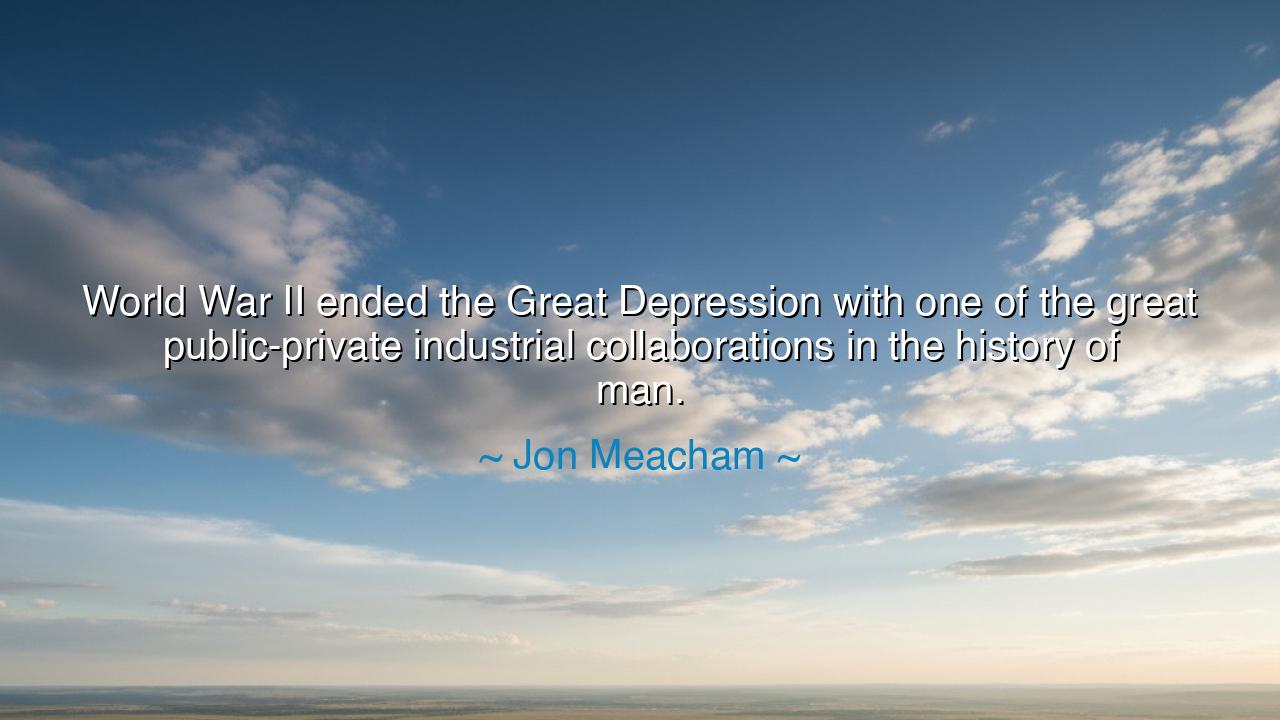
World War II ended the Great Depression with one of the great
World War II ended the Great Depression with one of the great public-private industrial collaborations in the history of man.






“World War II ended the Great Depression with one of the great public-private industrial collaborations in the history of man.” – Jon Meacham
In this solemn and powerful reflection, Jon Meacham, the chronicler of history’s moral lessons, speaks of a time when catastrophe and ingenuity walked hand in hand. His words recall one of humanity’s most paradoxical eras — when the fires of war gave birth to the engines of revival. He reminds us that it was not mere battle that lifted nations from despair, but the unity of purpose, the fusion of public vision and private enterprise, that turned devastation into renewal. The Great Depression, which had left fields barren and factories silent, was finally overcome not by wealth or chance, but by collaboration — by the collective will of governments, industries, and individuals who rose together to meet the demands of a world at war.
The origin of this truth lies in the crucible of the early 1940s. The Great Depression had stretched over a decade, gripping not only America but much of the industrialized world in poverty and fear. Millions were jobless; hope seemed a luxury few could afford. Yet when World War II erupted, it demanded of humanity a new kind of creation — not of art or commerce, but of survival. Armies needed weapons, navies needed ships, and skies demanded planes. And so, the silent factories of the Depression roared again to life. Governments, once hesitant to spend, poured resources into production. Industrial titans — Ford, General Motors, Boeing, and countless others — turned their genius from profit to purpose. What had been idle hands became the hands that built tanks, aircraft, and lifelines for the free world.
This was, as Meacham calls it, one of the great public-private collaborations in history — a partnership not written in contracts but in conviction. The government provided vision, direction, and resources; industry supplied innovation, speed, and scale. It was a dance of necessity and duty, of invention and organization, that transcended competition and ideology. For a brief, shining moment, the world’s mightiest industries were not divided by profit margins but united by a shared mission: to defend freedom and preserve civilization. Out of this union came not only victory, but a rebirth of the global economy, as nations discovered the immense power of coordinated effort.
Consider the story of Rosie the Riveter, the symbol of this transformation. Before the war, she might have been an unemployed worker or a homemaker watching her family struggle. But when the call came, she entered the factory with courage, wielding tools instead of despair. Alongside millions of others — men and women, engineers and laborers, soldiers and civilians — she became part of a machine greater than any single human ambition. Every rivet she hammered into a bomber’s wing, every ship launched into the Pacific, was an act of faith in the collective will of humankind. Her strength was not just mechanical but moral: the belief that when humanity unites for purpose, no obstacle can endure.
Yet Meacham’s words hold a deeper wisdom still. He does not glorify war, for he was too much a student of history to mistake tragedy for triumph. Rather, he shows us that from crisis, humanity can draw forth cooperation, and from destruction, creation. The end of the Depression was not a gift of war, but of what war forced humanity to become — a civilization capable of unity and innovation under pressure. The lesson is not that conflict is noble, but that collaboration is powerful; that when necessity compels us to work together, we rediscover the boundless potential that lies dormant in times of peace.
After the war, that same spirit of unity gave birth to the modern world — the highways, the universities, the global institutions, the technological revolutions that followed. Out of the crucible of destruction came the seeds of prosperity, because people remembered what they could achieve when they acted not as rivals, but as partners. Yet how easy it is, in times of comfort, to forget the lessons written in hardship. How swiftly cooperation turns again to competition, and unity to division. Meacham’s insight thus stands as both a reminder and a warning: the prosperity of nations depends not on their power alone, but on their ability to work together for the common good.
So, dear listener, take this teaching into your own heart: crisis does not forge greatness; collaboration does. When you face the storms of life — in your work, your community, your nation — remember that progress is not born of isolation, but of shared purpose. As the factories of the 1940s proved, the most impossible challenges can be met when we unite knowledge, labor, and spirit. Seek not only your own success, but the success of the whole; for the hand that builds beside another builds something eternal.
Let this be the enduring wisdom of Jon Meacham’s words: that the true wealth of a society lies in its unity of purpose, and that when people stand together — government, industry, citizen — even the darkest times can give birth to light. For in that partnership of hands and hearts lies the power not merely to survive history, but to shape it.






AAdministratorAdministrator
Welcome, honored guests. Please leave a comment, we will respond soon